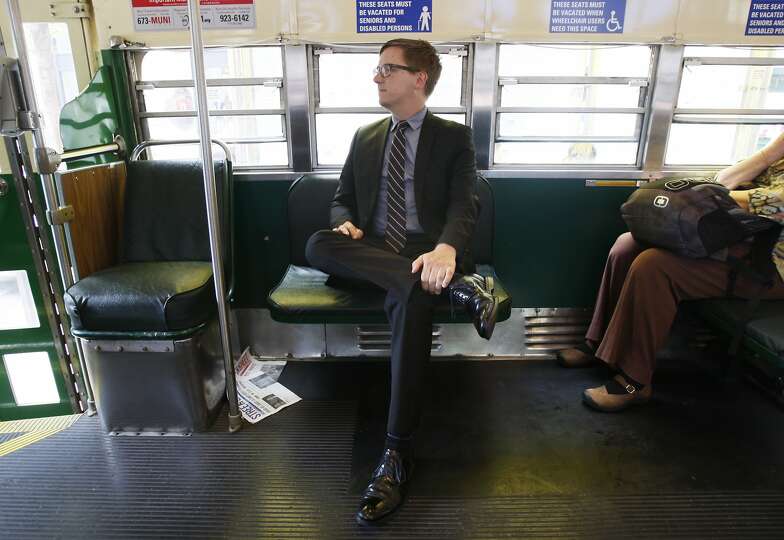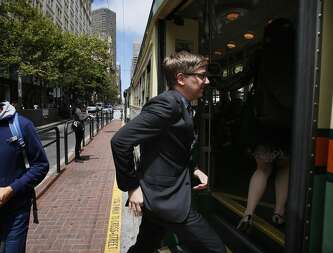S.F. Cultural Affairs director Tom DeCaigny champions artists
July 17, 2014 | Updated: July 18, 2014 3:02am

Craig Hudson, The Chronicle
San Francisco Cultural Affairs Director Thomas DeCaigny rides a Muni streetcar to a meeting at City Hall. DeCaigny says his role is to bring concerns of artists to policy conversations.
Growing up in the one-industry paper-mill town of Cloquet, Minn. (population 12,036), Thomas DeCaigny couldn’t have imagined that he would one day be the leading voice for the arts in San Francisco.
Following a career in grassroots organizations, DeCaigny was appointed in January 2012 as cultural affairs director for the San Francisco Arts Commission, just in time for citywide growth and transition.
“It’s an intense moment in San Francisco,” said DeCaigny, in a conversation about his job and the opportunities, to use his preferred thinking, for art and culture in the city. “It can be challenging to establish a viewpoint in a diversity of opinions and a complex ecosystem, but my role is to champion artists to be at the table with everyone else who is struggling and to make sure that the concerns of artists are represented in policy conversations.”
“It’s not just San Francisco going through this change, it’s a national transformation,” DeCaigny said. “Across the country we are seeing unprecedented reorganization and income disparity. It requires rethinking how we shape policy to foster equity and access. It’s also a time to think about how arts and culture are going to thrive.”
DeCaigny’s outlook is well suited to helm the arts commission, which includes the civic art collection, civic design review, community arts and education, cultural equity grants, public art and several cultural centers.
Upon arrival in San Francisco in 1998, after earning a bachelor’s in dramatic arts at Macalester College, he worked in nonprofits focused on theater, HIV prevention and youth workshops. He managed the AIDS Memorial Quilt’s National Youth Education program before joining the Performing Arts Workshop, a nonprofit focused on youth art education. In his nine years as executive director, he advocated for the arts in public education at the local, state and national level, and increased annual revenue, from $529,000 to $1.4 million, through federal funding for education research and strengthened alliances with donors and private foundations.
Creates partnerships
DeCaigny’s ability to cultivate partnerships played a part in his appointment following the resignation of Luis Cancel amid mismanagement issues.
Despite joining the arts commission at a rocky time, DeCaigny, 38, has brought an indomitable optimism drawn from life. In his teens, his working-class family was on welfare – an experience that taught him about class disparity and his belief that “a public investment is critical to ensuring that everyone has the same access to the transformative power of the arts.”
San Francisco Supervisor Eric Mar says that DeCaigny effectively brings artists and educators into the bureaucratic process. “Tom understands the need to shake up the ‘old boys network’ of arts funding for a broader, diverse audience,” Mar said. “He has a very positive approach to cultural and social equity.”

Craig Hudson, The Chronicle
S.F. Cultural Affairs Director Thomas DeCaigny says, “What I love about San Francisco, perhaps more than anything, is that dissent lives very well here.”
DeCaigny cites two town halls, to shape a new five-year plan, as his most rewarding experiences. “We heard loud and clear that the city needs to champion individual artists,” he says. “As demographics shift, the ways in which we participate in the arts should shift.”
Some notions are straightforward. He believes, for example, that BART running after midnight is critical to the future of culture. “What is going to keep a diversity of people in dialog with each other? The opportunity for affordable public transportation.”
Nonprofits’ troubles
Other issues are complicated, such as the woes facing nonprofits. He represented the arts in the Working Group on Nonprofit Displacement, a group of officials and stakeholders who put forward a recommendation for $4.5 million, approved by the Board of Supervisors, to assist nonprofits being priced out of the city.
The arts commission has also assisted some struggling nonprofits in developing survival strategies. DeCaigny has participated in meetings on the future of Intersection for the Arts and is optimistic. “Without a doubt, there is a strong community investment in Intersection’s programming and its fiscal sponsorship of more than 100 endeavors,” he says. “The transition team is some of the most incredible leaders in the arts.”
DeCaigny is undeterred by the messiness of debate within the art community but has no time for divisiveness. “What I love about San Francisco, perhaps more than anything, is that dissent lives very well here.”
‘Up to the community’
Other sectors, he says, such as affordable housing or public health, show up for the city decision-making process, while much debate in the arts is online. “We need to do more of it in person. Armchair activism on social media isn’t productive. We aren’t going to get where we need to go because we exhausted a rant on Facebook. It’s up to the community to decide what should survive and be championed.”
On the recent tech and real estate booms and their impact on the arts, DeCaigny is pragmatic. “There is this sense that we need to mourn the moment,” he said, “but what if we could take the visibility that the city has now (in the media) to create new solutions? There is a real way in which San Francisco could lead the country in looking at these issues.
“We still have more artists’ nonprofits, per capita, than any other city in the country. What do we want to preserve? What do we want to champion? We can have all of that, and we can have fun doing it.”
Christian L. Frock is an independent writer who writes about art and public life. E-mail:datebookletters@sfchronicle.com Twitter: @invisiblevenue
